

“A mentor is someone who sees more talent and ability in you, than you see in yourself, and helps bring it out of you.”
When I consider mentorship and those who have filled that role for me along the way, I first think of my parents. They were my first true mentors; they have helped me to believe in myself and develop strength of character. Their influence is rooted in my first name, something that caused me much trouble as a youngster. The kids at school mocked and bullied me because of it. “Chideha” looked and sounded strange to them, and to me. It caused me much anxiety and harmed my self-confidence.

Isiah & Della Warner, Dr. Warner receiving 2016 SEC Professor of the Year Award
Frankly, it was embarrassing to me. I was bitter toward my parents for naming me “Chideha.” Why couldn’t they have just given me a normal name, I wondered? Why couldn’t I have a name that was easier to pronounce and spell or that just sounded right, especially to the other kids? Why couldn’t they have named me something cooler, like my older brother’s name (he’d been named after my father), or simpler, like Edward, my younger brother’s name? In fact, he’d been named after my beloved grandfather, Edward James Blount, who was such an important mentor to me and whom I admired tremendously. Why hadn’t my parents named me Edward before my younger brother came along? I was so upset with my name that I told my parents I would seek to have it legally changed when possible, which greatly bothered them.
My dad explained to me how he and my mom had decided on my name. He said that since I was their second child and they’d named their first after him, they were seeking a unique and trendy name. My father had asked a graduate student from Nigeria who was in one of his classes at Texas A & M about possible African names for a boy. It was during the late ’70s, and African names had become trendy for African American babies. None of the names the student suggested to my dad caught his interest, but the student’s name did. His name was Chideha.
My dad asked the student about the origin of the name, and he explained that it came from the Igbo Tribe in Nigeria and meant “destiny.” My dad was stunned, and he and my mom believed the name showed strength and was different in a good way, and that’s when they decided it would be my name. As I matured, I recalled that story and began to feel a sense of peace and understanding about my name. I began to accept and embrace it, and now I can’t imagine being named anything else. I’m thankful to my parents for it, and I’ve let them know that. I try to live my life in a way that best represents the honor of my name.
The origin of my destiny was rooted in a challenge before my birth. My mother was in the final trimester of her pregnancy; I wasn’t expected for about another month, but apparently, I decided to arrive early. My dad was out of town on business when my mom went into labor. She drove herself to the hospital, nearly a half hour away. When I was born, my legs were angled toward each other in an unusual and unstable way. Doctors confirmed that I suffered from a severe calcium deficiency and said it was possible I might never walk properly. They put casts on my legs to help straighten them and thought I might spend my life in leg braces. I underwent continued treatments to help remedy the calcium deficiency and physical therapy sessions to help straighten my legs while enduring casts, braces and eventually special shoes. When I was four years old, my parents took me to a doctor in Houston, Texas, who suggested removal of the leg braces and special shoes previous doctors had recommended. I began wearing regular shoes instead. During the next couple of years, my legs began to show proper formation, and I gained strength. I was able to walk and run normally, and in elementary school I joined the baseball team. I was off and running and continued to play sports all through high school. That experience proved to me that it only takes one person to show faith in us to inspire us to take control of our own destiny.

Chideha Warner, 1978
Each of us is a product of our environment in terms of the influence we receive from those we spend the most time with, especially family. That certainly applies to my relationship with my brothers, because the influence they had on me while I was growing up and continue to have on me is considerable. Isiah Jr. is nine years older than I am; he provided a strong, positive example to me when I was young, particularly when it came to physical conditioning. He approached strength training seriously, and his consistent, rigorous workout regimen made a big impression on me. His chiseled physique reflected his efforts. That no-excuses approach stuck with me and doubtlessly provided some of the earliest fuel for my fitness-trainer fire. I’m three years older than my brother Edward, and our closeness in age allowed us to share many experiences and develop a stronger bond. Edward was born with Poland syndrome, a disease that greatly limits the development of chest muscles on one side of the body. At a young age, he was uncomfortable and self-conscious about it, especially around his teammates in the locker room. But Edward refused to be limited by his affliction. He gradually came to accept it and said it was a part of what made him unique.

Isiah Jr., Chideha and Edward Warner
Edward became a strong athlete and student and accepted a track and field scholarship to the University of Maryland, Baltimore County. He received the prestigious Arthur Ashe Courage and Humanitarian Award, an academic and sports-based award reflective of Ashe’s strength through adversity and commitment to fighting for one’s beliefs, no matter the cost. Edward was known for his high jump prowess and he is among the top two or three high jumpers in UMBC history. He attended law school at American University and is now an attorney in Baton Rouge.

Edward Warner, University of Maryland, Baltimore County
My parents instilled in me a strong work ethic and an understanding that we have to work hard for everything we want and that nothing worthwhile is just given to us. They helped me understand the value of money and to know that I couldn’t just toss it around. If I wanted that expensive pair of Air Jordan shoes, for example—and believe me, I did—then I had to show my commitment by saving my money to buy them. Sometimes, learning this lesson didn’t go exactly the way I planned it to go. I decided I needed a pair of those $100 Air Jordan shoes when Michael Jordan was bigger than life; he had just won several accolades and was at the top of his game. Everyone wanted a pair of Air Jordan shoes, including me, but I didn’t have the money to buy them. As the beginning of school was approaching, my anxiousness about getting those shoes was unbearable. I went to my dad and told him I needed a new pair of shoes, and he happily took me to the shoe store. I shared my excitement with him and let him know I knew the exact pair I wanted. I just knew in my mind that if I got my dad into the store, he would not deny me what I wanted. When we arrived at the store, upon showing him the $100 pair of shoes, his demeanor changed immediately. At first, I thought this was just an initial reaction and that he would understand how important these shoes were to me. I just knew he’d give in. He asked me if I had that kind of money and I replied “no.” He then let me know that if I wanted extravagancies like these shoes, I’d have to earn them. He stated that he definitely wasn’t going to be paying that price for my shoes unless I paid half. He knew I didn’t have the money at that time and stood his ground. I was so embarrassed that I didn’t get the shoes and that I expected my dad to cave. That’s how my parents raised me; they wanted to make sure I understood at an early age the importance of a work ethic and discipline and how those things were earned.
My dad, Isiah Manuel Warner, grew up in the blink-and-you’ll-miss-it town of Bunkie in rural Southeast Louisiana. He learned early in life that he would have to work extra hard to rise beyond the hardscrabble existence many endured in that part of the country at the time. His father, Humphrey, was a longshoreman and his mom, Erma, was a cook. Neither had more than an elementary school education. But both knew the importance of a work ethic and doing the right thing to overcome the challenges of life in the rural South, and they passed on that knowledge to my dad. The family didn’t have much in terms of money or possessions, but they carried a valuable understanding of character and principles. That understanding stuck with my dad, who picked cotton alongside his brother, Charles, in the blazing Louisiana heat to earn a dollar a day to help pay for school clothes. The humidity was so intense that steam rose from their backs as they worked.
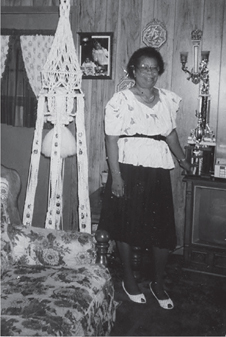
Erma St. Romain
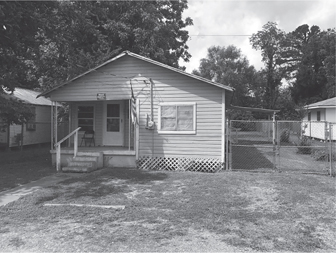
Warner home in Bunkie, Louisiana

Humphrey Warner Jr. and young Chideha
When they finished in the fields, they’d walk to town to eat at the restaurant where their mom worked. Segregation dictated that they ate outside, behind the restaurant, in the heat. My dad and uncle claim that when recalling those days, they can still feel the sting of sweat dripping into the cuts on their hands from the cotton burrs. Their work in the cotton fields provided a raw up-close look at the limited opportunity afforded by a lack of education and was instrumental in driving them to seek education and self-betterment.

Charles and Isiah Warner
That awareness, along with his work ethic and belief in what was possible for him in life, fueled my father’s push to become a college graduate with a degree in chemistry. He earned a PhD and rose to become vice president of strategic initiatives and achieve Boyd professor status (the highest professorial distinction bestowed by Louisiana State University) at LSU.

Isiah Warner, Southern University chemistry lab 1964
My mom, Della, always had a great knack for keeping me on track in life, for helping me to understand as a youngster that making the right decisions and treating people the right way were essential to building strong character. She let me know that taking shortcuts or trying to get what I wanted at the expense of others was the wrong way to go and would keep me from realizing my destiny. She’s always had a keen feel for how business works and has been a great influence on me with my own business decisions. Her parents were college graduates, so, along with her understanding of the core values in life, she knew the value of higher education. Her mother, Eris Blount, and father, Edward James Blount, believed that using that education to help others was essential in trying to make the world a better place. Eris Blount had the special ability to help me realize I was capable of giving more in life, and to see things from a perspective broader than only what was happening with me. And my awareness of the bigger picture increased when she was diagnosed with lung cancer. Watching her battle the awful disease while I was a teenager allowed me to witness courage up close, and it affected me in a big way. As her health quickly and steadily declined, she could no longer care for herself, so she came to live with our family. She was fiercely proud and strong-spirited, and her sudden, forced dependence on others was difficult for her to accept. While the reality of her illness was a serious blow to our family, I accepted it and understood that it was important for me to do my part to help her in any way possible. When I got home from football practice each day, I’d change her bedsheets or help her walk to the bathroom because she had grown too weak to walk unassisted.

Isiah and Della Warner, college days
Sometimes, we’d enjoy valuable conversations about life. She knew I loved to listen, so she’d share her advice and perspectives with me, and at other times, we’d just sit together in silence, appreciating the love and peace of the moment. No matter how sick she felt, she never complained. She always spoke of the good things in life. Those moments with her during her illness taught me what it means to be truly compassionate toward others. I also learned the value of patience, of what it means to slow down in our busy lives and to stop focusing on ourselves and channel that physical or emotional energy toward someone who really needs it. Those experiences with my grandmother and the inspiration I drew from her led me to commit to volunteering each week at a local nursing home, helping the residents with chair exercises to increase their mobility and circulation. The interaction and shared spirit with the residents through the years has been very special to me. My work at the nursing home is an extension of the influence of my dear grandmother.
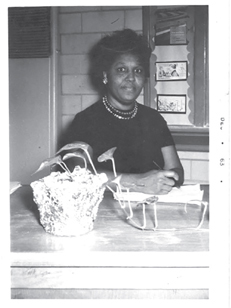
Eris Blount, 1963
My grandfather’s burning desire for education led him to attain a master’s degree from Texas Southern University in the ’50s, an achievement nearly unheard of for blacks in that era. He went on to help charter Waverly High School in Winnsboro, Louisiana, and he taught history there. He became principal and coached the girls’ basketball team, leading them to three state championships and a runner-up finish. My mom was a player on one of his teams, and his leadership and influence inspired her to become a referee and a coach. Leading by example and staying true to his discipline, he did push-ups and sit-ups each morning and participated in daily runs across campus with his players to improve their conditioning. Sports were a big part of my grandfather’s life and he was a stellar athlete. While attending college at Southern University (where my parents later met as students), my grandfather played and lettered in five sports, including football, baseball, basketball, track, and tennis. He saw sports as a strong vehicle for leadership. My grandfather was fearless in always seeking opportunities to improve the lives of others. He never sat back and complained or wondered why things weren’t getting done; he just did something about it. Where no path seemed to exist, he simply created it. He focused on what was possible, did his homework, and executed his plan to accomplish the mission. His faith was strong, and failure didn’t concern him; he just knew he’d find the way.
He insisted that education was paramount and people of all backgrounds deserved the right to learn. That belief drove him to spearhead the integration of schools in Louisiana and for equal voting rights for blacks. His tireless efforts to help improve the lives of others, especially minorities, created a stir and drew unwelcome and dangerous attention from groups that focused on hate and oppression.
One day, my grandfather returned home from fishing, his favorite hobby, and went to bathe. There was a knock at the door, and my mother, a teenager at the time, answered it. Several Ku Klux Klansmen burst into the house, white hoods covering their faces to mask their identities. They were armed with guns and baseball bats, and they began smashing through the house, screaming for my grandfather. Terrified, my mom told them he wasn’t at home, and they slowly began to leave, telling her they’d kill her if she were lying. Just as they were leaving, my grandfather came into the room, having heard the commotion from the bathroom but unsure of the source. The Klansmen grabbed him, pushed him to the floor, and began punching and kicking him and then pummeling him with the bats as he lay there naked. They repeatedly screamed nigger at him, my mom, and my Uncle Butch, also a teenager at the time, and held guns to their heads. One of the Klansmen smashed Butch in the face with a baseball bat as he tried to intervene. The cowardly men behind the white masks told my grandfather that word was out about the civil rights work he was doing and that if he knew what was good for him and his family, he’d get out of town immediately. My grandfather was unafraid for himself but was unwilling to risk the lives of his family, so he moved them to Dequincy, Louisiana, where he continued his work in education and pushing for civil rights. He also coached the high school football team there and led them to a state championship. Though the brutal reality of my grandfather’s experience is still painful for my mom and me to think about, I believe his story represents the strength and perseverance at the heart of my family and helps others to understand the formidable obstacles he and others had to overcome in the name of progress.
“There is no greater agony than bearing an untold story inside you.”
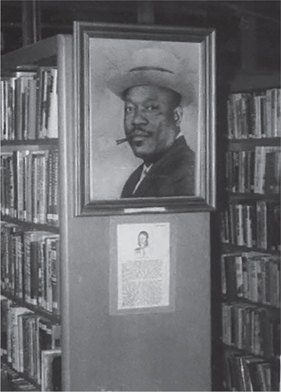
Edward J. Blount
My grandfather died at the age of fifty-three, leaving behind a powerful visionary legacy of work in education and civil rights. His efforts to overcome and achieve, no matter the challenges, have left an indelible mark on me, even decades later. His push to serve others and help them improve their lives inspires me daily and drives me to seek ways in which I may serve.
I am grateful for the positive example my grandparents set daily for my mom and dad and for the way my parents passed on those lessons to me as a youngster and still continue to teach me. The lessons of work ethic, humility, and sacrifice that they taught me, together and each in their own unique way, are a guiding light to me. They will always be my “pioneer mentors,” the first ones to help me understand that life is about using our skills and abilities, whatever they may be, in the best way possible as a positive influence on others.
Several years ago, I met a special man named Joe Bitzer. Joe served in the army, where he learned what discipline is all about. Joe was a blue-collar guy and spent some time as a truck driver after the military; his work ethic was ironclad. He later worked in construction, learning the business quickly and climbing the ladder of success. Eventually, Joe became a partner in a construction company, and his vision and leadership skills helped the company to thrive. When his partner wanted to sell his share of the company, Joe knew the opportunity to buy that share was too good to pass up, even if it meant taking a financial risk. He tapped a limited savings account, knowing the money was there to provide an emergency nest egg for his family. Joe’s wife pledged her support for the move, and Joe bought full ownership of the company. He made the gamble pay off and never looked back. Joe built Deerfield Construction into a strong, profitable company.
His story spurred my belief that perhaps I could own a business too. Joe helped me realize that with confidence in yourself and a strong vision, anything is possible. He provided invaluable guidance to me, and he still does. In fact, our businesses are located in the same office park, built on land Joe bought as his company grew. Joe trains with me regularly, and his determination and work ethic are on full display in the gym too. Joe is always working hard to better himself, by setting goals and pushing to reach them. He knows that trying to keep himself in good physical condition is an important part of his business and life. His company is a family affair, which is a great source of pride to Joe. He has stepped away from Deerfield Construction and passed on ownership to his sons, Steve and Scott, who continue to grow the company at an incredible rate. The leadership Steve and Scott display daily in running Deerfield has had a major positive impact on me. It’s not easy to guide a family-owned company successfully into a second generation. In fact, according to the experts, more than two thirds of family-owned businesses never make it that far. But Joe’s sons have made the most, and then some, of their opportunity to lead the company. They continue to build upon Joe’s original vision for Deerfield. The company has grown from $7 million in sales in the early 1990s to more than $50 million today.
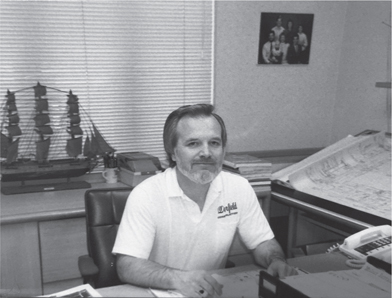
Joe Bitzer
Opening my business, Fitness3K, in the location shared with Deerfield Construction afforded me an opportunity to meet a man who would in a special way contribute to the foundation of my company. Fred Davis was a longtime building-maintenance man at Deerfield. Like me, Fred hailed from the South and that common ground allowed us to connect instantly.
Fred was nearly eighty years old when I met him and perhaps the hardest worker I have ever seen. He was also incredibly humble. That combination of hard work and humility made a lasting impression on me. Fred seemed to take a special interest in me from the time we met, and we spent a lot of time together. He was one of those guys who had a knack for telling great stories, and we shared many laughs. When I’d ask him if he wanted to train with me in the gym, for example, he’d smile and tell me mowing the lawn and taking out the garbage was all the exercise he needed. He had grown up in Alabama, so he enjoyed needling me whenever his beloved Crimson Tide football team beat my LSU Tigers. But I also savored any opportunity to learn from Fred’s life experiences and wisdom. In my gym, the walls are covered with an assortment of framed sports memorabilia and motivational quotes that inspire me and hold a special place in my heart.
Fred organized and hung all of the memorabilia and working alongside him during the process was a joy to me. Mostly, he worked, and I just tried to stay out of his way. When I’d pick up a hammer, he’d tell me to give it to him before I hurt myself. Fred’s humility and kindness are part of the fabric of Fitness3K. He was there to help lay the foundation. Fred died a few years ago, but his presence is still there in those frames on the walls of my gym, reminding me daily of his hard work and selflessness and making me want to help others just like Fred helped me. Fred was the furthest thing from a big corporate CEO type, but he was one of the richest men I’ve ever known in terms of character.
Each of these mentors has played a unique role in helping me along my way in life. From their experiences picking cotton, to obtaining PhDs, performing blue-collar labor to building successful companies, and all points in between, they have helped me to understand valuable life lessons. Though each one of them traveled a different life or professional path, the lessons they have taught me share a common theme: sweat, sacrifice, and seeking opportunities to help others get better and push for the greatness inside of them. They’ve taught me that focusing on only myself is an empty way to live, that the lasting rewards in life come from service to others. They’ve taught me about the importance of staying true to my belief in what is possible for me in life, which sometimes means taking risks to overcome the odds that may be stacked against me. It also means learning from the mistakes I make so that I don’t repeat those mistakes and cause myself unnecessary difficulty. They’ve taught me about the importance of realizing that no one knows it all and the value I can draw from the advice and experiences of those who believe in me and have been down the path before me.
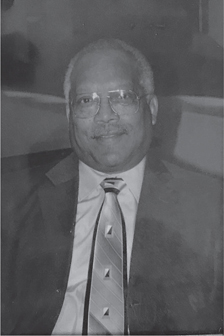
Fred Davis
Mentorship is a vital part of our working together to make our world a better place. It allows us to share the ride in life and learn from others’ important lessons that may help improve our own chances of success, while passing on our insight to others to help them succeed in turn. Mentorship means maximizing our belief in the potential of others and constantly pushing them to pull the most from themselves. It means helping them to raise the bar in terms of the success that is possible for them in life. It means being there to support them when they fall, by helping them to get back up and keep grinding. That rock-solid support is what my mentors have provided to me during my journey, and it means everything to me to try to do the same for my clients.
3K Movement Action Item 
As someone who had several obstacles and pitfalls along the way in the beginning of their career, I know firsthand what it means to need proper guidance from someone you highly respect or admire. That’s why I want to do my part in giving back to people who haven’t had the break they needed or the same opportunities I’ve had to succeed. Think about whom the mentors have been in your life; what have you learned from them? What setbacks has a mentor shared with you that you have learned from the most? At Fitness3K, we not only want to provide stellar service to our personal training clients, we also want to be a resource for up-and-coming trainers and business owners through our website, our social media podcast, or simply a phone call.
I firmly believe that teamwork makes dreams a reality. Henry Ford once said, “Coming together is the beginning, keeping together is progress, working together is success.” I believe in my heart that everyone ultimately wants to be successful in his or her career path but there are times when getting connected or finding the right network is the first challenge. To better keep yourself going in the right direction on your path, visit our website Fitness3K.com to check out the resources available to you or to set up a consultation to explore your journey’s compass.